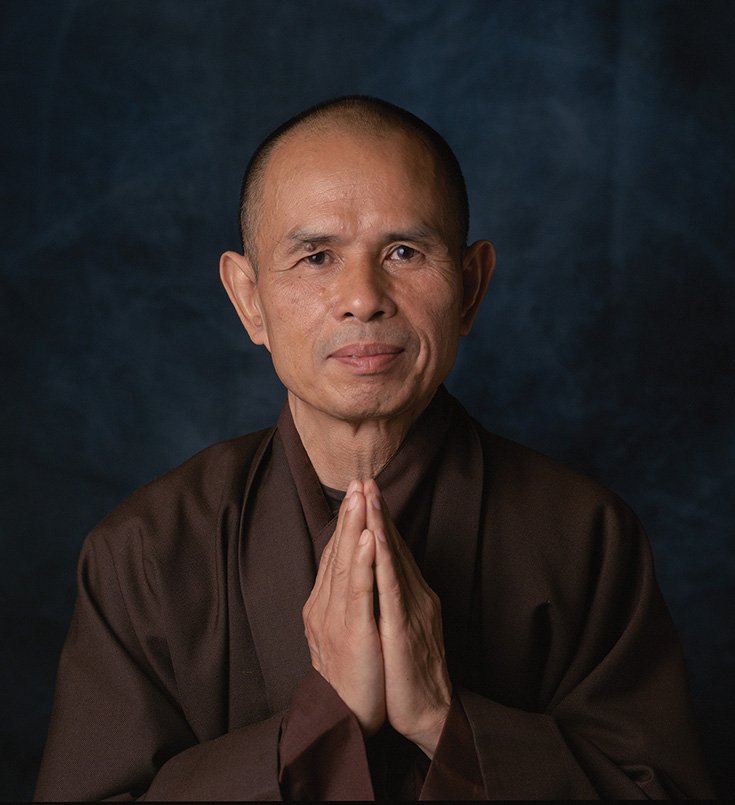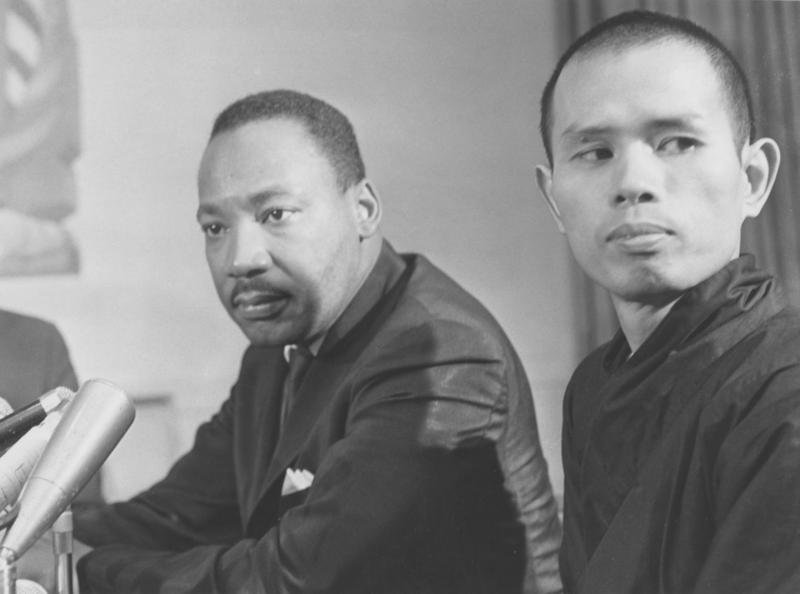Earlier this week, Vietnamese Zen master, poet and peace activist Venerable Thich Nhat Hanh passed away at the age of 95.
It would be difficult to overstate the tremendous impact Thich Nhat Hanh had on modern Buddhism. Known affectionately as “Thây” by his students and community, he was a living embodiment of the Buddha’s teachings whose commitment to peace and justice through nonviolent action gave birth to what we know today at “Engaged Buddhism.” His prolific spiritual teachings (from popular, accessible works to nuanced translations of classical Buddhist texts), his innovative spirit of creativity (he taught songs and hugging meditation), and his deep compassion touched millions.
So powerful was his work, that Dr. Martin Luther King Jr. nominated him for the Nobel Peace Prize after they met in 1966. As a colleague of mine, Maia Duerr, wrote in her recent blog:
“On the collective level, he infused our world with the possibility that peace could actually be lived, not just talked about, and that the practice of mindfulness was a medicine that could be applied to some of the deepest wounds of this world: militarism, poverty, addiction, and more… He had a unique way of directly addressing the daily needs and challenges of so many of us: veterans of war, school teachers, healthcare workers, activists, artists, just to name a few.”
with Dr. King in 1966, Img Thich Nhat Hanh Foundation
I had the privilege of practicing with Thây on several occasions in the late 90s. It was Thây’s rendering of the Buddhist fourth ethical precept that first inspired me to take on the deep practice of Right Speech:
Aware of the suffering caused by unmindful speech and the inability to listen to others, I vow to cultivate loving speech and deep listening in order to bring joy and happiness to others and relieve others of their suffering. Knowing that words can create happiness or suffering, I vow to learn to speak truthfully, with words that inspire self-confidence, joy, and hope. I am determined not to spread news that I do not know to be certain and not to criticize or condemn things of which I am not sure. I will refrain from uttering words that can cause division or discord, or that can cause the family or the community to break. I will make all efforts to reconcile and resolve all conflicts, however small.
The gift of his presence and his profound teachings are still with us, available in our true home: the here and now. Below are a few of his most famous teachings, along some personal inspirations, and several of his titles from my recommended reading list. To learn more about Thich Nhat Hanh’s life, check out this article on Lions Roar.
Teachings from Thich Nhat Hanh
On engaged Buddhism:
“When I was in Vietnam, so many of our villages were being bombed. Along with my monastic brothers and sisters, I had to decide what to do. Should we continue to practice in our monasteries, or should we leave the meditation halls in order to help the people who were suffering under the bombs? After careful reflection, we decided to do both—to go out and help people and to do so in mindfulness. We called it Engaged Buddhism. Mindfulness must be engaged. Once there is seeing, there must be acting… We must be aware of the real problems of the world. Then, with mindfulness, we will know what to do and what not to do to be of help.”
On walking meditation:
“Walk like a free person, free from the past and free from the future. The true miracle is not to walk on water, but to alk on planet earth… When you walk, kiss the earth with your feet.”
On peace work:
“When you produce peace and happiness in yourself, you begin to realize peace for the whole world. With that smile that you produce in yourself, with the conscious breathing you establish within yourself, you begin to work for peace in the world. To smile is not to smile only for yourself; the world will change because of your smile. When you practice sitting meditation, if you establish serenity and happiness inside yourself, you provide the world with a solid base of peace. If you do not give yourself peace, how can you share it with others? If you do not begin your peace work with yourself, where will you go to begin it? To sit, to smile, to look at things and really see them, these are the basis of peace work.”
On interconnectedness:
“If you are a poet you will see clearly that there is a cloud floating in this sheet of paper. Without a cloud, there will be no rain; without rain, the tress cannot grow; and without trees, we cannot make paper. If we look even more deeply, we can see the sunshine, the logger who cut the tree, the wheat that became his bread, and the logger’s father and mother. Without all of these things, this sheet of paper cannot exist. In fact, we cannot point to one thing that is not here—time, space, the earth, the rain, the minerals in the soil, the sunshine, the cloud, the river, the heat, the mind. Everything co-exists with this sheet of paper. So we can say that the cloud and the paper ‘inter-are.’ We cannot just be by ourselves alone; we have to inter-be with every other thing.”
On death and loss:
“Walking slowly in the moonlight through the row of tea plants, I noticed my mother was still with me. She was the moonlight caressing me as she had done so often, very tender, very sweet.. Each time my feet touched the earth I knew my mother was there with me. I knew this body was not mine but a living continuation of my mother and my father and my grandparents and great-grandparents… From that moment on, the idea that I had lost my mother no longer existed. All I had to do was look at the palm of my hand, feel the breeze on my face or the earth under my feet to remember that my mother is always with me, available at any time.”
On impermancne:
“If you know that things are impermanent, that the person you love today may die tomorrow, or leave you tomorrow, and then you come to the conclusion that what you can do to make her happy today, you have to do it today; what you can do to make him happy today, you should do it today. Tomorrow may be too late… If the insight of impermanence is alive in us, then we will not make this mistake. Our way of looking at him, at her, our way of smiling to him or to her, our little gestures of everyday will be filed with love, understanding, and compassion. And that can make her or him happy today, and if tomorrow something happens to him or to you, you will not regret. And this is the wisdom transmitted by the Buddha and that wisdom is based on your insight on impermanence.”
Recommended reading:
The Miracle of Mindfulness: An Introduction to the Practice of Meditation
The Sun My Heart: The Companion to The Miracle of Mindfulness
Old Path, White Clouds: Walking in the Footsteps of the Buddha



